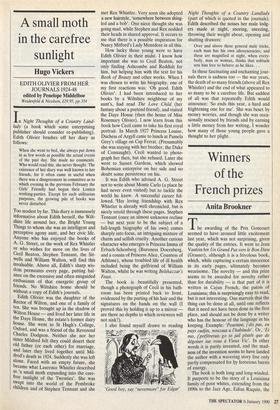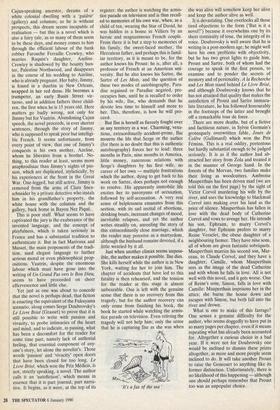Winners of the French prizes
Anita Brookner
The awarding of the Prix Goncourt seemed to have aroused little excitement last year, which was not surprising, given the quality of the entries. It went to Jean Vautrin for Un Grand Pas vers le Bon Dieu (Grasset), although it is a frivolous book, which, while capturing a certain innocence in its early pages, ultimately becomes wearisome. The novelty — and this prize seems to be awarded for novelty rather than for durability — is that part of it is written in Cajun French, the patois of Louisiana; this is surprisingly easy to read, but is not interesting. One marvels that the thing can be done at all, until one reflects that it need not have been done in the first place, and should not be done by a writer who has the honour of the language in his keeping. Example: `Pourtant, j'dis pas, en pays cadjin, nouzaut a l'habitude'. Or, 'Et mo, j'prefererais go to jail plut6t que de ddgoiser sur vous a Vieux Vic'. In other words it is partly invented, and the mad- ness of the invention seems to have landed the author with a wavering story line only partly compensated for by ferocious bursts of energy.
The book is both long and long-winded. It purports to be the story of a Louisiana family of poor whites, extending from the 1890s to the Jazz Age. Edius Raquin, the Cajun-speaking ancestor, dreams of a white colonial dwelling with a `galdrie' (gallery) and columns; as he is without prospects, this dream seems incapable of realisation — but this is a novel which is also a fairy tale, as so many of them seem to be these days, and money comes to him through the efficient labour of the bank robber Farouche Ferraille Crowley, who marries Raquin's daughter, Azeline. Crowley is shadowed by the bounty hun- ter, Palestine Northwood, and disappears in the course of his wedding to Azeline, who is already pregnant. Her baby, Jimmy, is found in a dustbin in New Orleans, wrapped in her red dress. He becomes a trumpeter, an early Basin Street vir- tuoso, and in addition fathers three child- ren, the first when he is 15 years old. Here matters go badly wrong, not only for Jimmy but for Vautrin. Abandoning Cajun speech, the novel proceeds, in ever shorter sentences, through the story of Jimmy, who is supposed to speak poor but intelligi- ble French. It seems unfortunate, from every point of view, that one of Jimmy's conquests is his own mother, Azeline, whom he liberates from a brothel. No- thing, to this reader at least, seems more anaphrodisiac than Jimmy's nights of pas- sion, which are duplicated, stylistically, by his experiences at the front in the Great War. One-legged, but still active, Jimmy is removed from the arms of Clara Snex- schneider by a private detective who instals him in his grandfather's property, the white house with the columns and the gallery, back home in Bayou Nez Piqué.
This is poor stuff. What seems to have captivated the jury is the exuberance of the invented language, and the concept of playfulness, which is taken seriously in France and has a substantial tradition to authenticate it. But in fact Marivaux and Musset, the main proponents of the tradi- tion, used elegant language to further serious moral or even philosophical prop- ositions. Vautrin, despite the enormous labour which must have gone into the writing of Un Grand Pas vers le Bon Dieu, seems to have proceeded on sheer effervescence and little else.
Yet just as one was about to concede that the novel is perhaps dead, that fiction is enacting the equivalent of the Fukuyama scenario, along comes Serge Doubrovsky's Le Livre Brise (Grasset) to prove that it is still possible to write with passion and vivacity, to probe intimacies of the heart and mind, and to indicate, in passing, what has been a discomfort for the reader for some time past, namely lack of authorial feeling, that essential component of any- one's story, let alone the novelist's. Those words 'passion' and 'vivacity' open doors that have been closed for too long. Le Livre Brise, which won the Prix Medicis, is not, strictly speaking, a novel. The author calls it an `autofiction', which means in essence that it is part journal, part narra- tive. It begins, as it were, at the top of its register: the author is watching the armis- tice parade on television and is thus recall- ed to memories of his own war, when, as a child of ten, wearing the Star of David, he was hidden in a house in Villiers by an heroic and magnanimous French couple. From there it is but a step to memories of his family, the sweet-faced mother, the Herculean father, and perhaps this is famil- iar territory, as it is meant to be, for the author knows his Proust: he is, after all, a professor of French at an American uni- versity. But he also knows his Sartre, the Sartre of Les Mots, and the question of these two modes of autobiography, Para- dise regained or Paradise negated, pre- occupies him, until he is recalled to order by his wife, Ilse, who demands that he devote less time to himself and more to her. This, therefore, is how he will pro- ceed.
But use is herself as fiercely fought over as any territory in a war. Charming, vexa- tious, extraordinarily accident-prone, Ilse mourns the life that Serge or the author (for there is no doubt that this is authentic autobiography) forces her to lead: three months in Paris, nine months in America, little money, rancorous relations with Serge's daughters by his first wife, no career of her own — multiple frustrations which the author, dying to get back to his work on Sartre, does perhaps not enough to resolve. His apparently immobile life excites her to paroxysms of accusation, followed by self-accusation. A very real sense of helplessness emanates from this section, with its sad recital of abortions, drinking bouts, incessant changes of mood, inevitable relapses, and yet the author writes steadily on, unreeling the story of this extraordinarily close marriage, which the reader may perceive as a martyrdom, although the husband remains devoted, if a little wearied by it all.
Just when another climax seems imposs- ible, the author makes it possible. use dies. She kills herself while the author is in New York, waiting for her to join him. The chapter of accidents that have led to this fatality is then rehearsed, and the tension for the reader at this stage is almost unbearable. One is left with the genuine sense that there is no recovery from this tragedy, but for the author recovery can only come from finishing his book, the book he started while watching the armis- tice parade on television. Even reliving the tragedy will not help him; only the sense that he is capturing Ilse as she was when
`It's a fax of the sea '
she was alive will somehow keep her alive and keep the author alive as well.
It is devastating. One overlooks all those tired objections to the form (Tut is it a novel?') because it overwhelms one by its sheer continuity of tone, the integrity of its voice. Doubrovsky is well aware that he is writing in a post-modern age; he might well have his own problems with objectivity, but he has two great lights to guide him, Proust and Sartre, both of whom had the courage to speak in the first person, to examine and to ponder the secrets of memory and of personality. A la Recherche and Les Mots stand behind Le Livre Brise, and although Doubrovsky knows that he has not attained that quality that makes the autofiction of Proust and Sartre immacu- late literature, he has followed honourably in the footsteps of the latter and brought off a remarkable tour de force.
There are more deaths, but of a fictive and factitious nature, in Sylvie Germain's grotesquely overwritten fable, Jours de Colere (Gallimard) which won the Prix Fernina. This is a real oddity, portentous but hardly substantial enough to be judged seriously. It is as if the author had ab- stracted her story from Zola and treated it in the manner of George Sand. In the forests of the Morvan, two families make their living as woodcutters. Ambroise Mauperthuis has been driven mad (we are told this on the first page) by the sight of Victor Corvol murdering his wife by the river, and uses the knowledge to blackmail Corvol into making over his land as the price of silence. Mauperthuis has fallen in love with the dead body of Catherine Corvol and vows to avenge her. He intends his son, Ephraim, to marry Corvol's daughter, but Ephraim prefers to marry Reine Verselet, the obese daughter of a neighbouring farmer. They have nine sons, all of whom are given fantastic sobriquets. Mauperthuis marries his second son, Mar- ceau, to Claude Corvol, and they have a daughter, Camille, whom Mauperthuis sees as the image of the dead Catherine and with whom he falls in love. All is not well with this novel, and it gets worse. One of Reine's sons, Simon, falls in love with Camille: Mauperthuis imprisons her in the attics; she burns the house down and escapes with Simon, but both fall into the river and drown.
What is one to make of this farrago? One senses a genuine difficulty for the author, who seems doggedly to have put in so many pages per chapter, even if it means repeating what has already been accounted for. Altogether a curious choice in a bad year. If it were not for Doubrovsky one would be inclined to dismiss these prizes altogether, as more and more people seem inclined to do. It will take another Proust to raise the Goncourt to anything like its former distinction. Unfortunately, there is no likelihood of this happening — although one should perhaps remember that Proust too was an unpopular choice.











































 Previous page
Previous page